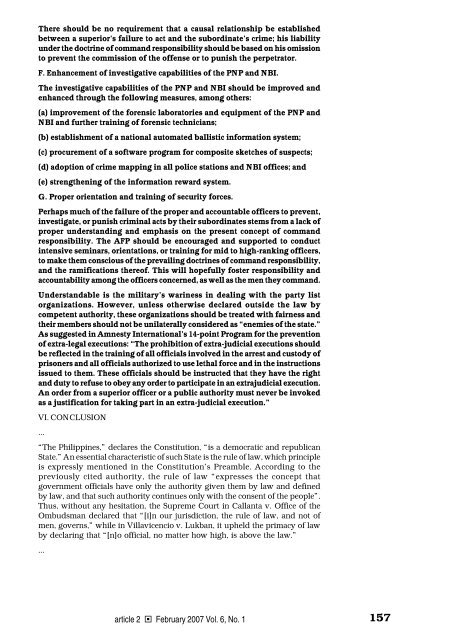of the Philippines the criminal justice system is - Article 2
of the Philippines the criminal justice system is - Article 2
of the Philippines the criminal justice system is - Article 2
Create successful ePaper yourself
Turn your PDF publications into a flip-book with our unique Google optimized e-Paper software.
There should be no requirement that a causal relationship be establ<strong>is</strong>hed<br />
between a superior’s failure to act and <strong>the</strong> subordinate’s crime; h<strong>is</strong> liability<br />
under <strong>the</strong> doctrine <strong>of</strong> command responsibility should be based on h<strong>is</strong> om<strong>is</strong>sion<br />
to prevent <strong>the</strong> comm<strong>is</strong>sion <strong>of</strong> <strong>the</strong> <strong>of</strong>fense or to pun<strong>is</strong>h <strong>the</strong> perpetrator.<br />
F. Enhancement <strong>of</strong> investigative capabilities <strong>of</strong> <strong>the</strong> PNP and NBI.<br />
The investigative capabilities <strong>of</strong> <strong>the</strong> PNP and NBI should be improved and<br />
enhanced through <strong>the</strong> following measures, among o<strong>the</strong>rs:<br />
(a) improvement <strong>of</strong> <strong>the</strong> forensic laboratories and equipment <strong>of</strong> <strong>the</strong> PNP and<br />
NBI and fur<strong>the</strong>r training <strong>of</strong> forensic technicians;<br />
(b) establ<strong>is</strong>hment <strong>of</strong> a national automated ball<strong>is</strong>tic information <strong>system</strong>;<br />
(c) procurement <strong>of</strong> a s<strong>of</strong>tware program for composite sketches <strong>of</strong> suspects;<br />
(d) adoption <strong>of</strong> crime mapping in all police stations and NBI <strong>of</strong>fices; and<br />
(e) streng<strong>the</strong>ning <strong>of</strong> <strong>the</strong> information reward <strong>system</strong>.<br />
G. Proper orientation and training <strong>of</strong> security forces.<br />
Perhaps much <strong>of</strong> <strong>the</strong> failure <strong>of</strong> <strong>the</strong> proper and accountable <strong>of</strong>ficers to prevent,<br />
investigate, or pun<strong>is</strong>h <strong>criminal</strong> acts by <strong>the</strong>ir subordinates stems from a lack <strong>of</strong><br />
proper understanding and emphas<strong>is</strong> on <strong>the</strong> present concept <strong>of</strong> command<br />
responsibility. The AFP should be encouraged and supported to conduct<br />
intensive seminars, orientations, or training for mid to high-ranking <strong>of</strong>ficers,<br />
to make <strong>the</strong>m conscious <strong>of</strong> <strong>the</strong> prevailing doctrines <strong>of</strong> command responsibility,<br />
and <strong>the</strong> ramifications <strong>the</strong>re<strong>of</strong>. Th<strong>is</strong> will hopefully foster responsibility and<br />
accountability among <strong>the</strong> <strong>of</strong>ficers concerned, as well as <strong>the</strong> men <strong>the</strong>y command.<br />
Understandable <strong>is</strong> <strong>the</strong> military’s wariness in dealing with <strong>the</strong> party l<strong>is</strong>t<br />
organizations. However, unless o<strong>the</strong>rw<strong>is</strong>e declared outside <strong>the</strong> law by<br />
competent authority, <strong>the</strong>se organizations should be treated with fairness and<br />
<strong>the</strong>ir members should not be unilaterally considered as “enemies <strong>of</strong> <strong>the</strong> state.”<br />
As suggested in Amnesty International’s 14-point Program for <strong>the</strong> prevention<br />
<strong>of</strong> extra-legal executions: “The prohibition <strong>of</strong> extra-judicial executions should<br />
be reflected in <strong>the</strong> training <strong>of</strong> all <strong>of</strong>ficials involved in <strong>the</strong> arrest and custody <strong>of</strong><br />
pr<strong>is</strong>oners and all <strong>of</strong>ficials authorized to use lethal force and in <strong>the</strong> instructions<br />
<strong>is</strong>sued to <strong>the</strong>m. These <strong>of</strong>ficials should be instructed that <strong>the</strong>y have <strong>the</strong> right<br />
and duty to refuse to obey any order to participate in an extrajudicial execution.<br />
An order from a superior <strong>of</strong>ficer or a public authority must never be invoked<br />
as a justification for taking part in an extra-judicial execution.”<br />
VI. CONCLUSION<br />
...<br />
“The <strong>Philippines</strong>,” declares <strong>the</strong> Constitution, “<strong>is</strong> a democratic and republican<br />
State.” An essential character<strong>is</strong>tic <strong>of</strong> such State <strong>is</strong> <strong>the</strong> rule <strong>of</strong> law, which principle<br />
<strong>is</strong> expressly mentioned in <strong>the</strong> Constitution’s Preamble. According to <strong>the</strong><br />
previously cited authority, <strong>the</strong> rule <strong>of</strong> law “expresses <strong>the</strong> concept that<br />
government <strong>of</strong>ficials have only <strong>the</strong> authority given <strong>the</strong>m by law and defined<br />
by law, and that such authority continues only with <strong>the</strong> consent <strong>of</strong> <strong>the</strong> people”.<br />
Thus, without any hesitation, <strong>the</strong> Supreme Court in Callanta v. Office <strong>of</strong> <strong>the</strong><br />
Ombudsman declared that “[i]n our jur<strong>is</strong>diction, <strong>the</strong> rule <strong>of</strong> law, and not <strong>of</strong><br />
men, governs,” while in Villavicencio v. Lukban, it upheld <strong>the</strong> primacy <strong>of</strong> law<br />
by declaring that “[n]o <strong>of</strong>ficial, no matter how high, <strong>is</strong> above <strong>the</strong> law.”<br />
...<br />
article 2 • February 2007 Vol. 6, No. 1 157

















